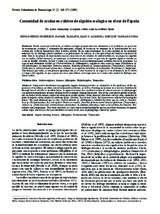Comunidad de arañas en cultivos de algodón ecológico en el sur de España
The spider community in organic cotton crops in southern Spain
Autor
Pérez-Guerrero, Sergio
Tamajón, Rafael
Aldebis, Hani K.
Vargas Osuna, E.
Editor
Sociedad Colombiana de EntomologíaFecha
2009Materia
Cultivo orgánicoOrganic farming
Araneae
Miturgidae
Philodromidae
Thomisidae
METS:
Mostrar el registro METSPREMIS:
Mostrar el registro PREMISMetadatos
Mostrar el registro completo del ítemResumen
Frente al manejo tradicional, el cultivo ecológico proporciona una alternativa a los problemas de aparición
de resistencias, residuos y contaminación ambiental, además de favorecer un aumento de la biodiversidad del ecosistema
por el efecto beneficioso sobre la fauna auxiliar. En los agroecosistemas, la acción conjunta de los enemigos
naturales de los fitófagos puede mantener a las poblaciones de muchos de ellos por debajo del umbral económico de
daño. Uno de los grupos de depredadores menos conocidos en los estudios de control natural de las plagas del algodón
son las arañas (Orden Araneae), de modo que se realizaron prospecciones en parcelas de algodón orgánico situadas en
el sur de España: Córdoba, Sevilla y Cádiz. Los ejemplares se recolectaron mediante la batida directa de las plantas. La
especie más abundante resultó ser Cheiracanthium sp. (Miturgidae), seguida de otras especies como Philodromus sp.
(Philodromidae), los tomísidos Thomisus onustus, Runcinia grammica y Synema globosum (Thomisidae), Salticus sp.
(Salticidae) y Larinia lineata (Araneidae). Además se recogieron individuos de las familias Theridiidae y Linyphiidae.
Este trabajo, por tanto, es una primera aproximación en el conocimiento de las especies y su abundancia en el cultivo
ecológico del algodón, lo que supone una base para futuras investigaciones en el marco del control de fitófagos mediante
arañas. Compared to traditional management, organic farming provides an alternative to the problems of the appearance
of resistance, residues and environmental pollution, as well as favoring an increase in ecosystem biodiversity
through beneficial effects on other fauna. In agroecosystems, the combined action of natural enemies on phytophages
can maintain populations of many of them below economic damage thresholds. One of the least known groups of predators
in studies on the natural control of cotton pests are the spiders (Order Araneae), therefore surveys were conducted in
plots of organic cotton situated in southern Spain: Córdoba, Sevilla and Cádiz. Specimens were collected by beating the
plants. The most abundant species was Cheiracanthium sp. (Miturgidae), followed by other species such as Philodromus
sp. (Philodromidae), the crab spiders Thomisus onustus, Runcinia grammica and Synema globosum (Thomisidae),
Salticus sp. (Salticidae) and Larinia lineata (Araneidae). In addition, individuals were collected from the families Theridiidae
and Linyphiidae. This work, therefore, is a first step in understanding the species and their abundance in organic
cotton crops, and will be the basis for future research in the area of phytophage control by spiders

